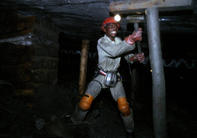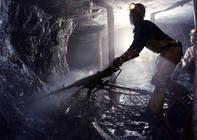Three Decades on the Mines
After nearly three decades on the mines, Thabiso has worked his way up to stope leader – the man who heads the team that prepares the rock wall for blasting. His squad of five will drill into the rock, rig up the explosives and head to the surface. Boom. Then another team goes down to do the clean-up.

On a good day it will take five hours to prepare the wall. A bad day could take up to eleven and there is usually no time to stop and eat. Each rock is different, some rocks are harder than others, he says. They never know what they are going to face on any given day.
Earlier in the weekend, 24 hours before his departure, Thabiso sits at the table in his kitchen, its fading grey-beige melamine top worn down to white after years of chopped vegetables, rested elbows, dinner plates and mugs of tea.
His face is occasionally stern, sometimes impassive as he slouches into his folded arms, giving a bulleted summary of his history on the mines. Every now and then, though, his face breaks into a rising-sun smile.
Working the Night Shift
He has spent the past seventeen years working the night shift, he explains: starting work at nine at night, down some of the deepest mine shafts in the world, only getting up to the surface again by about five the next morning, if everything goes well.
When he surfaces at dawn, he will clean himself up, grab a bite to eat (the mine cooks for them) and go to bed in a room that he shares with seven other men, like a boy in a boarding school dormitory.
Because the men’s days are split between three different shifts – morning, afternoon, night – they are all coming and going, socialising, sleeping, playing and leaving for work at different times. So he never really has a full day’s sleep that is not disturbed in some way.
And then it gets broken at lunchtime – his body’s middle-of-the-night – when he must rouse himself to queue for food from the mine’s dining facility. There is tension when some of the men in the dormitory want to party, he says, but it gets dealt with. He does not say how.
How Does it Feel?

You do not get a seasoned miner to talk about his feelings easily. You probably do not get him to talk about them at all. Imagine asking him: how does it feel, tapping your sternum, here, inside? How does it feel here, in that universal place in your chest where every one of us experiences the physical clawing of fear, longing, loneliness, love, pain, anxiety and joy?
How does it feel to step out of that cage after a ten-minute plummet down a spaghetti-thin lift shaft into the kind of heat that sucks the breath from your lungs, that coils itself around your ribcage and tries to wring the life out of you?
Thabiso hears the question, but does not really know how to respond. He tries to remember those moments when the lift doors recoiled for the first time, spilling the 23-year-old Thabiso and the rest of the men out into the hell of the deep below.
It was dark, he remembers, and they only had headlamps; his ears were blocked from the change in pressure. ‘Ja,’ he says, ‘I experienced panic. I experienced suffocation from the heat.’ How did he deal with it, with the panic? ‘There was nothing I could do.’
If He Had His Life Over Again
Thabiso talks a bit about how some men crack up. Not often, but it happens. Some will leave after their first shift, and never go back down. Ja, the other men see them as weak. ‘It took me a month to get used to it. I never thought of quitting.’ And that is it. That is all he will say about what it is like to claw your way through that stifling air that reaches up to 55 degrees. It can be hotter, still, at the face, although air conditioning these days tries to wrestle the mercury down a bit.
That is all he will say of what it is like to work away at the gold-face for the bulk of your waking life with a universe of angry rock creaking, shuddering, splintering, crumbling, groaning, jerking and wrenching above your head, trying to crush itself down on you night after night after night after long, hot, endless, sweltering night.
If he could have his life over again, he would be an auto mechanic. Or he would go into bricklaying. Or he would try his hand at agriculture again. But if he had his life over again, he would need to be born into the kind of circumstances that allowed him to get at least a basic education.
He had already tried to get these kinds of jobs before, when he was younger, but it did not work out. So when his father, Lebona, finally hung up his miner’s lamp about 25 years earlier, he took his son up to the Reef and got him a job. That is not unlike many of the young men of Lesotho.
By Leonie Joubert